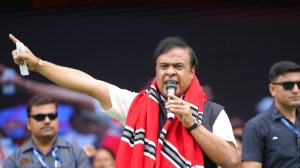Aravinda, Manjrekar support review system
Manjrekar and Aravinda De Silva have supported the umpire review system to be introduced by the ICC.

Former Test cricketers Sanjay Manjrekar and Aravinda De Silva on Monday supported the umpire review system to be introduced by the International Cricket Council for the first time on an experimental basis during the July-August India-Sri Lanka Test series.
Manjrekar, who will be the anchor for Ten Sports during the Test and ODI series to be played in Sri Lanka from July 23-August 29, felt that whenever a third umpire is brought into the picture there is enhanced interest among viewers at the ground and in front of the TV.
“The spectator interest rises whenever a decision is referred to the third umpire. Yes, there could be some slowing down of the proceedings, but I feel the bigger culprit is the dismal over-rates maintained by teams which slows down the game a lot,” said the 42-year-old former India Test and ODI middle order batsman.
Former Test and ODI batsman De Silva, who is a member of the interim committee of the Sri Lanka Cricket (Board) headed by his one-time skipper Arjuna Ranatunga, said that if technological help is available for the umpire to take the correct decision then it must be given to the official.
“When you have a system in place to eliminate doubts (in the umpire’s mind) we should make use of it even if cuts down the pace of the game a bit because you are playing with the careers of cricketers and their future,” he said at the function to announce IDEA Cellular as the title sponsors of the series in the Emerald Isle.
As per the experimental umpire review system, the batting and fielding side will be allowed three unsuccessful appeals to be referred to the (third) umpire per innings to change a decision if it is perceived to have been incorrect.
These appeals can be made only by the batsman in receipt of the umpire’s original decision or the captain of the fielding side.
The on-field umpire will then consult with the third umpire who will review available TV coverage of the incident before relaying fact-based information back to his colleague who will take the final call on the matter.
The Cricket Board has agreed to implement the trial for the three-Test series from July 23-August 12.
The two former cricketers differed whether the switch-hit, as was played by England’s Kevin Pietersen by changing his stance from right to left before the ball was bowled against New Zealand during the on-going ODI series, should be allowed or not.
Aravinda felt that it was unfair for the bowlers when batsman are allowed to switch from being right-handed to left or vice versa when they are about to deliver the ball while Manjrekar felt that for the moment he would go by the decision of the game’s lawmakers Marylebone Cricket Club to allow it.
“When you allow switch-hitting you should also allow the bowler from getting a leg before decision to balls pitched outside the leg stump if they would have gone and hit the stumps. You should give the bowler also some chance to get wickets,” De Silva said.
But Manjrekar supported MCC’s views that this was a high-risk shot which gives bowlers more chances to get the batsmen out.
Photos





- 01
- 02
- 03
- 04
- 05

























